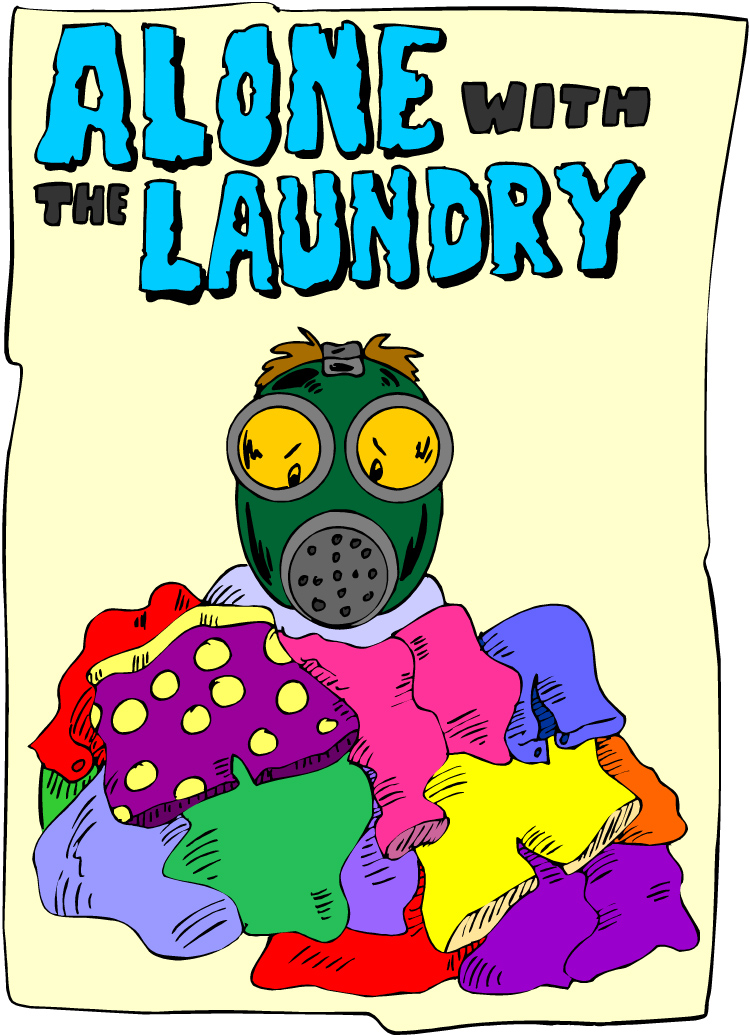Laundry – FREE On-Campus
 Laundry is one of those life skills that all college students need to know. You no longer have your parents there to do your laundry, and you’re left on your own to figure it out for yourself for (probably) the first time ever.
Laundry is one of those life skills that all college students need to know. You no longer have your parents there to do your laundry, and you’re left on your own to figure it out for yourself for (probably) the first time ever.
While you probably don’t know exactly what you’re doing, laundry isn’t as forgiving as you might think. Aside from the fact that you can ruin your clothes by making a single mistake, such as throwing something in the dryer that shouldn’t be or mixing that dreaded red sock in with your whites.
But on top of all of that, there is a certain etiquette that you need to know when doing laundry in the Residence Halls. So to help you avoid ruined clothes, embarrassment and a laundry room fight, here is the Residence Hall laundry room etiquette that you need to know.
- BRING ENOUGH CHANGE
- While laundry at King University is FREE for all residential students, other laundromats around the area will not be. Some places have a payment system, and others have coin-operated machines. No matter what type of payment the machines require, be sure that you have it.
- Before you go to do your laundry, make sure you have enough change/money to do so. There’s nothing more annoying than someone asking you for spare change, or waiting around to steal someone’s machines.
- KEEP TRACK OF TIME
- Probably the biggest laundry faux-pas you can make is leaving your clothes in the washer/dryer long after they’re done.
- Not only do you have to make sure you have enough time allotted BEFORE starting your laundry, but you also have to make sure that you keep track of how long your clothes have been in the machines.
- Most people leave when doing laundry, as it gets boring sitting in an uncomfortable chair waiting for your laundry to be done. But if you’re going to do it this way, make sure you set a timer so you know when to go back for your clothes.
- There are other residents that need to do laundry too, and if you’re holding up a machine because you didn’t get your clothes out in time, you’re going to frustrate a lot of people.
- DON’T BE IMPATIENT
- I can’t stress enough how important this one is.
- More often than not, clothes are left sitting in a washer/dryer — done, but their owner hasn’t removed them yet.
- As tempting as it may be, do not remove them.
- It’s simple enough really: you wouldn’t want anyone touching your clothes, so don’t do it to others. Maybe someone has items that can’t go into the dryer that you’ll ruin by doing so, or maybe you’ll leave before they get back so they don’t know where their clothes went.
- If there aren’t any available machines and someone’s clothes are done, but no one’s claiming them, it doesn’t matter. You’ll have to wait for the next available machine, and hope that the owner comes in quickly.
*This should be an extra incentive to follow rule number 2.
- DON’T BE OBNOXIOUS
- When you’re doing laundry at home, it’s perfectly fine to separate your clothes into several loads, taking over the machine for the day because other family members don’t need it.
- This is not okay when you’re using a communal washer/dryer.
- There’s always going to be another person that needs to do laundry, so using up a machine all day long because you’re washing clothes individually isn’t acceptable.
- So group clothes together where you can (mix darks and whites if possible, or combine clothes and towels/sheets) to save yourself time and to save some machines for others that may need them.
- If you find that you need to do multiple loads, spread them out during the week. It’s much better than monopolizing one machine all day long, as you never know what times the laundry room is going to be busy.
- BE CONSIDERATE
- Whenever possible, be considerate of others. Bring your own money, soap and dryer sheets, change loads when the machine is done, and don’t spend more time than needed at any given machine. Basically, follow the rules and you’ll be fine.
- Also, plan ahead. If you know you have a presentation coming up, wash those clothes ahead of time. That way, you won’t be fighting a crowd at the laundry room and you won’t be in as much of a time crunch, which means you’ll probably be much more considerate of others.
- Doing laundry in the residence halls can be a real hassle, and many people aren’t aware of the basic laundry room etiquette that everyone should know.
- But now that you do, follow the rules and be considerate of others, and also help those that may not know. It just might save you some time some day.
(This article comes from The USA TODAY College partner network.)
Laundry Advice
- Do laundry during an off-time (generally, not on Sunday). Try to do it while people are in class or at an event. A weekday morning is a good time.
- A full load of clothes takes less time to dry than a few items. The few items will clump together and not dry as fast whereas a full load will continually redistribute the water vapor.
- When you pull your clothes out of the dryer they may feel hot but may not be dry. Give everything a minute to cool down so you can tell if it’s actually dry before you haul warm, damp clothes back up to your room.
- Feel the inside of pants pockets to make sure they have dried.
- Keep a laundry basket on top of your machine so someone waiting can toss your laundry into a basket rather than in a pile on the floor. Being considerate of other people makes it more likely that you will not find your clothes dumped on the laundry room floor, missing or destroyed. (But remember that theft occurs regularly in college…it’s bestnever to leave your clothes unattended!)
- Follow the directions on the detergent box. There are several different formulas and some require less detergent than others. It also depends on the size off the washer you use.
- Pick a laundry detergent with a scent you like. There are also odor-free detergents for those who dislike or have issues with scents.
- If you have a few damp items from different loads you can combine them into one dryer (or the dryer with the most time left) to finish drying.
- To test colored items that might bleed during a wash- dip a small corner of the fabric into a glass of water mixed with a tablespoon of detergent at the approximate washing temperature; if the water becomes colored after the item is removed, it needs to be washed separately or with similar colors.
- Monitor your clothes while they spin in the dryer. If you hear loud thumping noises coming from your dryer, you may want to open the door and redistribute the clothes.
- If you know you’re washing clothes this weekend, check and make sure you have enough detergent.
- If you choose to leave your laundry while it’s running, set an alarm to remind you to move your laundry over or take it out of the machine. Other people need to use the machines.
- Towels can take the longest to dry because they will absorb the moisture from most of your other clothes in the dryer. If you can find a dryer that doesn’t smell scorched you can dry your towels separately on high heat for a little while to get them extra dry.
- Make sure you are washing with a laundry detergent. Don’t use dish washing detergent or other cleansers. They can ruin your clothes or the machine. Additionally, laundry additives should not be confused with detergent. Clorox 2 is an additive as is OxiClean, bleach and fabric softeners. These are optional items that are meant to be used in addition to detergent if desired.
- Make sure you take out ALL your clothes from the washer and the dryer.
- Check the temperature setting by opening the dryer during the cycle. The cylinder will slowly stop spinning after the door is opened so you can make sure the temperature is not too cool or too hot. Closing the door and hitting the Start button again will restart the cycle.
- If you have nasty stains (like wine or dirt), try rubbing something on it before washing your clothes. (You can find stain-removal products near the laundry soap in any store.)
- If you love how clean clothes smell, consider putting a dryer sheet in each of your drawers, putting one between your towels, or hanging a few randomly in your closet.
- Because college laundry rooms have so many machines, consider having a night where you and your friends hang out and do something to pass the time while washing clothes. That way everyone’s clothes get clean and you can at least have some fun in the process.
Doing laundry in college can be a challenge — but it can also be easier than you might think. Just remember: you don’t have to be psychic to do laundry correctly. But you do have to read, so just check the labels on something if you’re not sure.
Laundry How To’s
 Laundry at King University is provided by the Caldwell & Gregory Company. The folks at C&G shared some great tips with us, and we are passing them on to you. Please follow the links below for some valuable “Laundry How To’s”:
Laundry at King University is provided by the Caldwell & Gregory Company. The folks at C&G shared some great tips with us, and we are passing them on to you. Please follow the links below for some valuable “Laundry How To’s”:
How to Operate a Front Load Washer
How to Operate a Top Load Washer
What do the Clothing Tag Symbols Mean?
Taking Care of your Blue Jeans
Outstanding Alternatives to Bleach

Green Laundry Tips
While your roommates may leave lights on and shirk their recycling duties, you can feel good about practicing these environmentally-friendly laundry habits:
- Save water by washing only full loads instead of multiple small loads.
- Use cold water for rinsing whenever possible.
- Dry similar fabrics together to reduce drying time and ensure even drying.
- Pick the dryer that still feels warm to the touch—this will shorten drying time.
- Don’t overfill the dryer—doing so wastes energy, time, and money.
- Clean the lint filter before each dryer cycle to maintain proper air circulation and speed up the drying process.